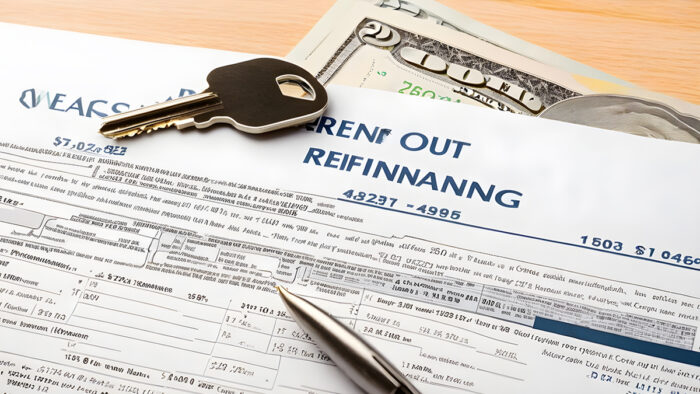Is cash-out refinance new to you? If it is, then you do not have to worry because you are going to get detailed information. If you need to access cash by replacing your current mortgage with a larger loan, then you should go for cash-out refinancing. Getting a new home that is more than your current house is possible with cash-out refinancing.

The cash that will be given to you will be taken from the difference between the new mortgage amount and the balance on your previous mortgage. However, this money can be used for different things. For instance, you can spend it on home improvements, debt consolidation, and other expenses.
What is Cash-Out Refinancing?
Cash-out refinancing is a financial strategy where a homeowner replaces their existing mortgage with a new one that has a higher loan amount. The homeowner receives the difference between the two loans in cash, which can be used for various purposes such as home improvements, debt consolidation, or other financial needs.
Buying a home is a good investment. At the same time, you might want to do a lot of renovations and repairs. This is where cash-out refinancing comes in.
How Does a Cash-Out Refinance Work?
The cash-out refinancing process is quite easy. The same process you go through when you buy a home is similar to this. Once you meet the requirement, you can go ahead and choose a lender.
Then submit an application and documentation to Underwriting. After that, get approved and wait for your check.
How Much Cash Can I Get On A Refinance?
The value of your home will depend on the amount you can borrow. Before you go researching how much you qualify for, make sure you have your home upgraded.
However, lenders will not borrow more than 80% of your home’s value. Though it varies from lender to lender, it also depends on the arrangement with your lender.
Am I Eligible For a Cash-Out Refinancing?
Not everyone is eligible for cash-out refinance. It is available to homeowners with both conventional and government-backed mortgages.
How Do I Get the Best Cash-Out Refinance Rates?
Compared to regular refinances, cash-out refinance rates are usually higher. When you turn equity into debt, there is a high chance you will lose your home to foreclosure. However, if you want to get the best rates, here are some steps you should take.
• Boost your credit score
Your credit score has a role to play in your cash-out refinance rates. With a 780 score or higher, you can get the lowest rates on a conventional cash-out refinance.
• Borrow less
If you want to get the best cash-out refinance rates, you have to reduce your borrowing. How much you are borrowing compared to the value of the home is what impacts your cash-out rate. So, the higher your LTV ratio, the higher your rate will be.
• Make home improvements
Improving the standard of your home will also increase its value.
• Shop around for lender offers
Do your research and shop around for multiple loan offers. Also, you can collect loan estimates from three to five lenders or use an online comparison site.
FAQs
How Much Can I Get Out of A Cash-Out Refinance?
The amount of money you can get depends on the lender. But generally, you can get a loan for up to 80% of your home’s value. Though some lenders may offer higher amounts,.
What Are the Requirements For Cash-Out Refinance?
You should have a credit score of at least 620, a 43% or lower debt-to-income ratio, and 20% equity.
How Long Do You Have to Wait to Get a Cash-Out Refinance?
To qualify for a conventional loan, you will need to have owned the house for a minimum of 6 months.
Do You Pay Taxes On A Cash-Out Refinance?
No, you do not. The money gotten from cash-out refinancing is considered a loan. Since it is a loan, it cannot be used to pay tax.
When is A Cash-Out Refinance a Good Option?
Homeowners who need cash in hand should consider cash-out refinance. It is also a good option for homeowners who meet the requirements of the refinance loan and need more than 80% of their home equity. Instead of financing with a credit card, you are better off with cash-out refinances.
When is A Cash-Out Refinance A Bad Idea?
Cash-out refinance is a bad idea when you want to use the cash to consolidate debts.
How Much Equity Do You Need For A Cash-Out Refinance?
A minimum equity of 20% is required for a cash-out refinance. This 20% equity has to be built up in your home before meeting other cash-out refinance requirements.
Is It Difficult to Get A Cash-Out Refinance?
No, it is just difficult. You just need to have a decent credit score above 620 and a good credit history. Also, you must have stable job security and earning potential and meet the requirements.



